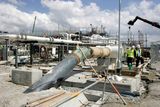For life after 12.5pc, Irish rugby offers a winning startup playbook

When Ireland lined out against Wales yesterday to open their Six Nations campaign, the team represented the product of decades of planning, process and a nationwide focus.
Before the sport became professional in 1995, Irish rugby lacked a formalised national development infrastructure. The decades since have seen long-term planning with connected thinking from the top to the grassroots, and results have followed. The development of provincial academies, schools and clubs has resulted in strong regional talent pipelines fuelling the national programme.
Ireland became the number-one ranked team in the world last November when we beat New Zealand (again), it was seen less as a David vs Goliath shock, and rather a well-prepared team fulfilling its potential.
Read more
An FDI nation
Over that same 30-year period, Ireland also achieved extraordinary feats on the economic pitch. In the 1990s, a new economic vision for Ireland came into focus: to become the number one country in the world for foreign direct investment (FDI), the gateway to Europe, the most globalised, open economy in the world. It was a bold vision.
Ireland took drastic measures, reducing our corporation tax from 40pc to 12.5pc. This, combined with our low cost-base and highly educated English-speaking workforce, formed the basis of our national competitiveness. We went out to play the game on the global stage, and won.
The Changing landscape
However, we have now lost two key pillars: 12.5pc and a low cost-base. We can no longer expect the same results from a changing game.
What’s more, our success with FDI resulted in an unbalanced economy, with a high concentration of risk and over-reliance on a relatively small number of multinationals. We need to be vigilant to this vulnerability in the face of shifting macroeconomic trends accelerated by Covid, including a shift from globalism towards economic nationalism. If the next generation is to replicate the prosperity and growth brought by FDI, then we need to form a new economic vision for Ireland. One that leverages the presence of FDI, yet is rooted in indigenous innovation.
Ireland became a world FDI leader, then the world’s top rugby nation. Can it also become the world’s top startup nation?
Looking to France
Next weekend, Ireland’s Six Nations campaign heads to Paris, where French innovation policy offers a glimpse of what is possible. In 2017, French President Emmanuel Macron vowed “to make France a startup nation”, setting the clear goal of having 25 French unicorns (companies worth at least $1bn) by 2025.
Macron then cut the ribbon on Station F in Paris, the largest startup hub in the world. A privately led, government-supported initiative, Station F served as a symbol of France’s new ambition to create an innovation economy.
Last month, France celebrated its 25th unicorn, three years ahead of schedule. ‘The Macron Impact’ resulted in four times the amount of investment in startups over five years, making France a leader on the global innovation stage.
Recent evidence shows how important startups will be to driving future European growth. Investment into European startups was up by a multiple of three times year-on-year in 2021, and a multiple of 10 times from five years ago. It took decades to reach $1trn of collective value in European startups, but only two years to reach $3trn of value. We’ve reached an inflection point. There is a major opportunity but it requires clear vision and a commitment to grassroots talent.
A startup nation
Ireland’s domestic startup scene has flourished in the past five years, with seven home-grown unicorn companies. Intercom reached this milestone in 2018, joined since by Fenergo, Workhuman and LetsGetChecked. Already in 2022 we have two new unicorn startups, Flipdish and Wayflyer.
But there’s still work to be done. Last year, when we in Dogpatch Labs took over the running of our national startup accelerator, we took inspiration from the story of the IRFU. We partnered with regional hubs to scout and train the best talent, created feeder programmes to find the best startup talent from across Ireland for the national accelerator, bringing together the best coaches and ‘former players’ and transforming key aspects of how we approach the game.
Our FDI nation story can also serve to empower us forward towards creating a startup nation story. I believe we can be both a global leader in FDI and also in startups. One can serve to strengthen the other, forming the basis of a unique national competitive advantage.
A new economic vision
From the rugby pitch to the economic pitch, Ireland has a record for setting out bold visions and winning big. As we consider life after 12.5pc, it’s clear the game has shifted. There is now an economic imperative for Ireland to evolve our economic vision, to be bold in our strategy and to play to win. And we should have every sense of belief that it is well within our grasp.
Patrick Walsh is CEO of Dogpatch Labs, innovation hub and home to national startup accelerator, NDRC.
Join the Irish Independent WhatsApp channel
Stay up to date with all the latest news















